|
|
|
Sort Order |
|
|
|
Items / Page
|
|
|
|
|
|
|
| Srl | Item |
| 1 |
ID:
171944
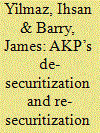

|
|
|
|
|
| Summary/Abstract |
This article evaluates the Turkish state’s relations with the Alevi community through a securitization theory framework. It first examines the issue in its historical context, comparing Kemalist and more recent policies, and highlights that despite the ideological differences between the previous governments and the current AKP government, for Alevis much has remained the same. It then turns to the securitization of the Alevis by successive regimes, and demonstrates that the period of de-securitization begun under the AKP did not end the practice, and that political expedience led to the issue’s re-securitization.
|
|
|
|
|
|
|
|
|
|
|
|
|
|
|
|
| 2 |
ID:
172110
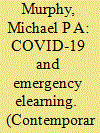

|
|
|
|
|
| Summary/Abstract |
The COVID-19 pandemic quickly led to the closure of universities and colleges around the world, in hopes that public health officials’ advice of social distancing could help to flatten the infection curve and reduce total fatalities from the disease. Drawing on Copenhagen school securitization theory and analyzing 25 declarations of emergency eLearning at American universities, I argue that in addition to COVID-19 being framed as a general threat, face-to-face schooling was also presented as a threat through these policies. A review of securitization theory—with particular attention to the question of advocacy and the relationship of desecuritization to emancipation—grounds the investigation theoretically. I argue that securitization theory is an important tool for educators not only for observing (and understanding) the phenomenon of emergency eLearning, but also for advocating the desecuritization of schooling after the COVID-19 crisis passes.
|
|
|
|
|
|
|
|
|
|
|
|
|
|
|
|
| 3 |
ID:
105955
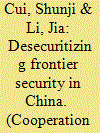

|
|
|
|
|
| Publication |
2011.
|
| Summary/Abstract |
Should 'security' or 'securitization' be accorded positive or negative value? The Copenhagen School prefers desecuritization (positive value) to securitization (negative value). By examining securitization and desecuritization processes in China's approach to frontier security, the Copenhagen School argues that, in general, a strategy of desecuritization has proved effective. However, that does not mean that desecuritization should be seen as inherently positive; indeed, China's desecuritization strategy still encounters problems. To build conditions for a lasting frontier security, it is necessary to go beyond the current state-centric national security discourse and to give more attention to the societal security of the frontier people, their identity and culture. Thus, it is suggested in this article that frontier security studies should transcend 'positive-negative' debates and focus more on the 'referent object' of security: who and what we really want to secure and the means by which these objectives can be achieved.
|
|
|
|
|
|
|
|
|
|
|
|
|
|
|
|
| 4 |
ID:
109595
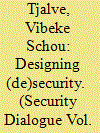

|
|
|
|
|
| Publication |
2011.
|
| Summary/Abstract |
This article pursues three interrelated objectives. Above all, it seeks to theorize desecuritization at the level of polity rather than policy; to distinguish between forms of political order and the likelihood that they will give in to the call for exceptional measures. Second, and to achieve that goal, it suggests a turn away from continental notions of 'the people' and towards American debates over 'the public sphere': a realm deliberately designed and continually cultivated to exercise autonomous, pluralistic and politicized contestation. Third, it examines why the 'speechlessness' of contemporary Western security practices may inhibit that public sphere from functioning properly.
|
|
|
|
|
|
|
|
|
|
|
|
|
|
|
|
| 5 |
ID:
192162
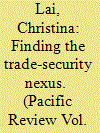

|
|
|
|
|
| Summary/Abstract |
Over the last few decades, China has become one of the most important foreign investment destinations and centers of economic development in Asia. China’s growing economic clout and coercive measures lead to the following empirical puzzles: how has Taiwan perceived China’s increasing military capabilities and economic influence? What are the major factors that facilitate or constrain the role of a government agency of a weaker state in addressing the economic power of a stronger one? More specifically, what has been the purpose of Taiwan’s economic statecraft? Based on Taiwan’s official statements, regional trade data, and newspaper coverage in Chinese and English, this study investigates both positive and negative evaluations of China-Taiwan trade from 2009 to 2021. From 2009 to 2016, President Ma Ying-jeou adopted a desecuritization strategy in normalizing bilateral trade with China, and he actively promoted greater liberalization of Taiwan’s financial and service sectors for China’s investment. From 2016 to 2021, President Tsai Ing-wen employed a securitization strategy in light of the risks of economic reliance on China’s markets. The article proceeds as follows. First, it engages the current literature on economic statecraft, China-Taiwan relations, and Asian politics. Second, this study offers a framework of desecuritization and securitization of Taiwan’s trade toward China, and it highlights how the political leaders in Taiwan attempt to find a balance between trade and security. Third, it provides in-depth case studies on how Taiwan executed desecuritization and securitization strategies. Finally, it concludes with some initial thoughts on the studies of comparative economic statecraft, and provides policy implications for countries in the Asia Pacific region and beyond.
|
|
|
|
|
|
|
|
|
|
|
|
|
|
|
|
| 6 |
ID:
113726
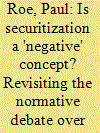

|
|
|
|
|
| Publication |
2012.
|
| Summary/Abstract |
The purpose of this article is to revisit the normatively defined debate over securitization as a negative conception. Claudia Aradau's work has largely served to define this debate, with Aradau arguing that securitization/security is an inherently negative conception inasmuch as its mode of extraordinary politics necessarily both institutionalizes fast-track decisionmaking ('process') and produces categories of enemy others ('outcome'). In making evident the main assumptions therein, my argument is that this debate has taken place not only in terms of a specific - and indeed contestable - rendering of the securitization concept, but also in terms of a more general acceptance of an essentialized (Schmittian) logic of security. The article thus seeks ultimately to demonstrate the value of de-essentializing the practices evoked by speaking security and to show how this enables meaningful engagement with other emerging conceptions of 'positive' security.
|
|
|
|
|
|
|
|
|
|
|
|
|
|
|
|
| 7 |
ID:
139412
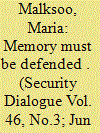

|
|
|
|
|
| Summary/Abstract |
This article supplements and extends the ontological security theory in International Relations (IR) by conceptualizing the notion of mnemonical security. It engages critically the securitization of memory as a means of making certain historical remembrances secure by delegitimizing or outright criminalizing others. The securitization of historical memory by means of law tends to reproduce a sense of insecurity among the contesters of the ‘memory’ in question. To move beyond the politics of mnemonical security, two lines of action are outlined: (i) the ‘desecuritization’ of social remembrance in order to allow for its repoliticization, and (ii) the rethinking of the self–other relations in mnemonic conflicts. A radically democratic, agonistic politics of memory is called for that would avoid the knee-jerk reactive treatment of identity, memory and history as problems of security. Rather than trying to secure the unsecurable, a genuinely agonistic mnemonic pluralism would enable different interpretations of the past to be questioned, in place of pre-defining national or regional positions on legitimate remembrance in ontological security terms.
|
|
|
|
|
|
|
|
|
|
|
|
|
|
|
|
| 8 |
ID:
083438
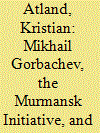

|
|
|
|
|
| Publication |
2008.
|
| Summary/Abstract |
In October 1987, during a visit to the Kola Peninsula, the Secretary-General of the Soviet Communist Party, Mikhail Gorbachev, launched a series of policy initiatives which ultimately came to mark the beginning of the end of the Cold War era in the Arctic. The move was aimed at transforming the northern part of the globe from being a sensitive military theatre to becoming an international `zone of peace'. This objective was to be achieved through the establishment of a nuclear weapons-free zone in Northern Europe, restrictions on naval activities in Arctic seas, and the development of transborder cooperation in areas such as resource development, scientific exploration, indigenous people's affairs, environmental protection and marine transportation. This article analyses the contents of the Murmansk initiative, the context in which it was launched, the extent to which it materialized, and the degree to which it contributed to a normalization of interstate relations in the Arctic. In addition to being motivated by historical interest, the article aims at exploring the Copenhagen School concept of `desecuritization' and shedding light on the challenges and opportunities of turning security issues into non-security issues.
|
|
|
|
|
|
|
|
|
|
|
|
|
|
|
|
| 9 |
ID:
161492
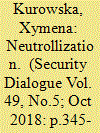

|
|
|
|
|
| Summary/Abstract |
This article considers the significance of trolling for security processes through a contextual analysis of industrialized pro-Kremlin trolling in the Russian blogosphere. The publicity surrounding Russia’s hacking activities in international politics conceals the significance of the domestic trolling culture in Russia and its role in the ‘trolling turn’ in Russia’s foreign policy. We contextually identify the practice of ‘neutrollization’ – a type of localized desecuritization where the regime adopts trolling to prevent being cast as a societal security threat by civil society. Neutrollization relies on counterfeit internet activism, ostensibly originating from the citizenry, that produces political disengagement by breeding radical doubt in a manner that is non-securitizing. Rather than advocating a distinct political agenda, and in contrast to conventional understandings of the operations of propaganda, neutrollization precludes the very possibility of meaning, obviating the need to block the internet in an openly authoritarian manner. It operates by preventing perlocution – that is, the social consequences of the security speech act. This prevention is achieved through the breaking or disrupting of the context in which acts of securitization could possibly materialize, and is made possible by a condition of ‘politics without telos’ that is different from the varieties of depoliticization more familiar in Western societies.
|
|
|
|
|
|
|
|
|
|
|
|
|
|
|
|
| 10 |
ID:
151177
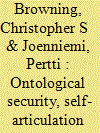

|
|
|
|
|
| Summary/Abstract |
The concept of ontological security has made increasing headway within International Relations, in particular through its ability to offer alternative explanations of the forces underpinning security dilemmas and conflict in world politics. While welcoming the insights already provided by its application, this article argues that the concept’s use to date has been too much geared to questions of identity-related stability, with change viewed as disturbing and anxiety-inducing. In contrast, the article calls for a more open understanding that: (i) links ontological security to reflexivity and avoids collapsing together the concepts of self, identity and ontological security; (ii) avoids privileging securitization over desecuritization as a means for generating ontological security; and (iii) opens out the concept beyond a narrow concern with questions of conflict and the conduct of violence more towards the theorization of positive change.
|
|
|
|
|
|
|
|
|
|
|
|
|
|
|
|
| 11 |
ID:
077351
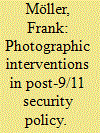

|
|
|
|
|
| Publication |
2007.
|
| Summary/Abstract |
Regardless of its cultural and discursive turn, the field of security studies has not yet paid sufficient attention to visual culture. In particular, approaches that focus on the articulation of security have been quite inattentive to images. With respect to post-9/11 security policy, it is argued here that the images of planes crashing into the World Trade Center have become not only a legitimacy provider for security policy but also part of every person's visual reservoir and pictorial memory, on which the successful articulation of security in part depends. It is therefore suggested to link the study of securitization with the study of both images and pictorial memory. The present article, by discussing three visual projects revolving around 9/11, looks for desecuritizing potential in photography and examines the extent to which photography can offer oppositional interventions in security policy. However, the surplus meaning that images inevitably carry with them, while limiting the securitizing potential of images, also reduces the extent to which opposition can rely on images
|
|
|
|
|
|
|
|
|
|
|
|
|
|
|
|
| 12 |
ID:
163751
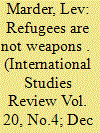

|
|
|
|
|
| Summary/Abstract |
In 2010, Kelly Greenhill published her highly acclaimed book Weapons of Mass Migration: Forced Displacement, Coercion, and Foreign Policy. In this article, I focus on the uses and implications of Greenhill's theory and specifically the metaphor Greenhill uses in place of “coercive engineered migration”—“weapons of mass migration.” The metaphor unmistakably links refugees to “weapons of mass destruction.” This should not be dismissed as just a phrase, considering that metaphors are one of the fundamental elements of thinking in international relations. Inquiring into the utility of the metaphor, I argue that associating refugees with weapons (1) weaponizes the metaphor against refugees, (2) frames the problem and possible solutions in a restrictive, securitized way that should be questioned, and (3) even undermines one of four policy options Greenhill herself proposes. After highlighting the merits of Greenhill's analysis and its embrace among far-right ideologues and conspiracy theorists, using Paul Chilton and George Lakoff's delineation of three utilities of metaphors in foreign policy, I analyze the “weapons of mass migration” metaphor. The article ends with a discussion of possible ways to mitigate the metaphor's effects and discusses alternative metaphors.
|
|
|
|
|
|
|
|
|
|
|
|
|
|
|
|
| 13 |
ID:
163099
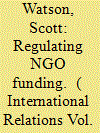

|
|
|
|
|
| Summary/Abstract |
Securitization theory (ST) has succeeded in putting the relation between politics and security at the forefront of research in security studies. Despite this success, little attention has been given to the way states themselves produce the boundaries of legitimate political activity, particularly in relation to the boundaries between civil society and the state and between the foreign and domestic. This article is concerned with how states see the boundary between the political and the non-political as a matter of security. It investigates this question by examining the international and national efforts to restrict the financing of non-governmental organizations (NGOs) and civil society actors. It demonstrates that these entities are deemed threatening to the established boundaries of legitimate political activity and thus subject to harassment, increased regulation, and eradication. This is done by the depiction of their activities as political, rather than humanitarian/cultural/social, demonstrating that the concepts of politics operative in the ST literature are already delimited through processes of securitization and depoliticization. Continued research into the relation between politics and security must therefore consider the ways that the political itself is securitized.
|
|
|
|
|
|
|
|
|
|
|
|
|
|
|
|
| 14 |
ID:
054389
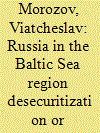

|
|
|
| 15 |
ID:
085377
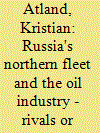

|
|
|
|
|
| Publication |
2009.
|
| Summary/Abstract |
Described as one of the world's most promising new energy provinces, the European Arctic is no longer primarily seen as a military playground. Russia's approach to the region is increasingly governed by national economic interests rather than by national security interests. The development of offshore oil and gas fields, the construction of new pipelines and terminals, the increasing traffic of oil tankers to Western Europe and the United States, and the conversion of naval yards to civilian production represent both new challenges and new opportunities for the Russian Navy. Issues that were previously considered crucial to the country's national security have slowly but steadily been "desecuritized," and new patterns of civil-military relations have emerged. This article discusses the relationship between the Russian petroleum industry and the Northern Fleet and the interplay between Russian commercial and military interests in the post-cold war European Arctic.
|
|
|
|
|
|
|
|
|
|
|
|
|
|
|
|
| 16 |
ID:
088710
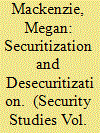

|
|
|
|
|
| Publication |
2009.
|
| Summary/Abstract |
This article focuses on the construction of "soldier" and "victim" by post-conflict programs in Sierra Leone. Focusing on the absence of individual testimonies and interviews that inform representations of women and girls post-conflict, this article demonstrates that the ideal of the female war victim has limited the ways in which female combatants are addressed by disarmament, demobilization, and reintegration (DDR) programs in Sierra Leone. It is argued that titles given to female soldiers such as "females associated with the war," "dependents," or "camp followers" reveal the reluctance of reintegration agencies to identify females who participated in war as soldiers. In addition, I argue that men and masculinity are securitized post-conflict while women-even when they act in highly securitized roles such as soldiers-are desecuritized and, in effect, de-emphasized in post-conflict policy making. The impact of this categorization has been that the reintegration process for men has been securitized, or emphasized as an essential element of the transition from war to peace. In contrast, the reintegration process for females has been deemed a social concern and has been moralized as a return to normal
|
|
|
|
|
|
|
|
|
|
|
|
|
|
|
|
| 17 |
ID:
153112
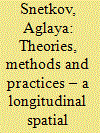

|
|
|
|
|
| Summary/Abstract |
How do securitizing actors go about desecuritizing policy issues that have been securitized across multiple spatially bounded referent objects? Do such desecuritizations develop as a single or manifold process and with what political effect? And critically, how do we methodologically approach the study of such processes? These are pertinent questions that have been left underexamined in the (de)securitization literature. In seeking to fill this gap, this article makes two main points. First, it calls for a greater focus on the study of (de)securitizations that are constructed according to multiple spatially bounded referent objects, and on how these diverging strands of discourse and practice shape the overarching process. Second, it argues for a greater use of longitudinal methods of analysis as a better way to capture the evolutionary dynamics of desecuritization processes, which (re)constitute security policies and agendas. To illustrate these claims, the article considers the empirical case of Russia’s (de)securitization of insurgent threats since 2000 by tracing this process over a longitudinal period and across three spatial-referent objects, namely the local level: Chechnya; the sub-federal level: North Caucasus; and the national level: Russia.
|
|
|
|
|
|
|
|
|
|
|
|
|
|
|
|
| 18 |
ID:
101960
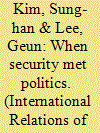

|
|
|
|
|
| Publication |
2011.
|
| Summary/Abstract |
This study delves into an empirical case analysis of the desecuritization process of the North Korean threat under the Kim Dae-jung government. Unlike previous studies, it analyzes how domestic and international actors desecuritized traditional threats by taking the pluralistic political processes of a democratic polity seriously. This was the process of competition between different political coalitions and the process of transformation from issues of high politics into issues of low politics. It remains to be seen whether the Kim Dae-jung government's desecuritization of North Korean threats was a deep or a shallow one, but it appears to be clear that the desecuritization of North Korean threats by the Kim Dae-jung government paved the way for another 5 years of progressive government with Roh Moo-hyun's 'unexpected' victory in the 2002 presidential election.
|
|
|
|
|
|
|
|
|
|
|
|
|
|
|
|
|
|
|
|
|